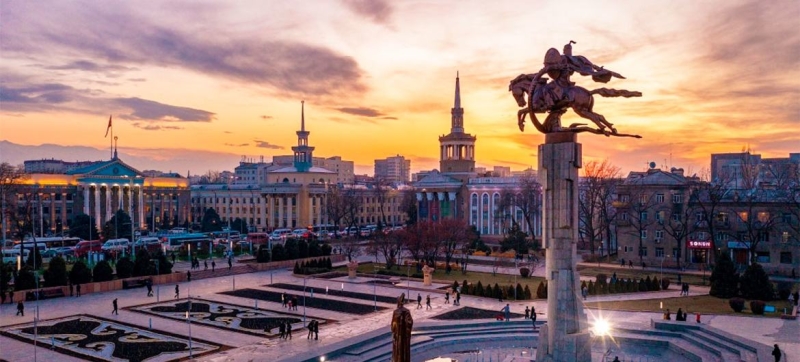
View of Bishkek, the capital of Kyrgyzstan. INTERVIEW | Bishkek: the city is growing, becoming greener and “smarter” Economic development
The capital of Kyrgyzstan has tripled in size in recent years and acquired new transport. In Bishkek, they began to build bicycle paths and plant greenery on the facades of schools and houses. On World Cities Day, which is celebrated on October 31, First Deputy Mayor of Bishkek Mirlanbek Baigonchokov spoke in an interview with Lyudmila Blagonravova about how the capital is turning into a more environmentally friendly and convenient metropolis.
MB:In recent years, Bishkek has achieved significant progress in implementing large-scale changes, which were, in turn, aimed, of course, at developing the city and improving the quality of life of people. I would like to note the main changes that affected the following areas. Just last year we underwent an administrative-territorial reform, within the framework of which the city of Bishkek more than tripled in size. If before this the territory of Bishkek occupied about 13 thousand hectares, then it has grown to almost 41 thousand. This imposes certain obligations on the municipality. Over the past few years, we have begun to build and reconstruct social facilities on a large scale, including schools, kindergartens, medical centers, various sports facilities and public spaces in general. Last year alone, we built about 10 kindergartens and four educational facilities. We completed the reconstruction of our central square, the reconstruction of the Alga complex and other social facilities. At the same time, a master plan for the city of Bishkek until 2050 is being developed. We began to update public transport, we began to purchase electric buses and gas-powered buses. We are implementing various innovative projects related to parking. For the first time in the city, we began installing rotary parking lots. Of course, these are the first steps, I think that we will not stop there. Issues of ecology and landscaping are also pressing, and we have begun to implement the Thousands of Green Walls project and other large-scale environmental initiatives. We began to improve the transport management and waste management systems. We are actively engaged in landscaping, landscaping lawns, parks, cleaning rivers, and improving street lighting. LB: Can you give examples of some projects or programs that have already been implemented and which have led to concrete results? MB: The city of Bishkek annually adopts a socio-economic development program, on the basis of which the directions and priorities for the development and budgetary policy of the city are determined. Thanks to a systematic approach, we carry out about 80 percent of the planned activities. Last year we carried out the modernization and rehabilitation of central streets, water supply and sewerage systems. We improve the quality of service, introduce modern technologies into public services. We introduce various innovative methods in a digital format. Thus, we have developed and implemented the “My City” application, where every citizen can contact the authorities with problems, and we promptly respond to requests. We also included a function for tracking public transport in this application, so that a citizen, when standing somewhere at a stop, can see which route will take this stop and when public transport will arrive. We have also introduced a transport mode for the visually impaired with a voice alert, so that our citizens can know where they have arrived. We are also introducing intercity traffic indicators. We also introduced recording of production work, which overlaps with the “My City” application, where there are requests from citizens regarding the performance of their duties by municipal services. In the period after the pandemic, we identified five informal settlements, where about 75 thousand people live, and implemented a pilot project with connections to water, sewerage, and road construction. This project was implemented with the support of the UN and the UN Economic Commission for Europe (UNECE). LB: Tell us about the project that is currently being implemented with the support of UN agencies and which is aimed at reducing poverty. MB: With the support of the UN, we began implementing this project, and there the main focus was on improving social protection, simplifying access to assistance, and introducing a social contract model to involve families in business. The relationship between poverty and food security and food. The main goal was to reduce dependence on social assistance and increase the resilience of vulnerable groups of the population. LB: You have already mentioned environmental problems. A big problem in Bishkek is air pollution. Tell us about what programs are being implemented in this area. MB:
